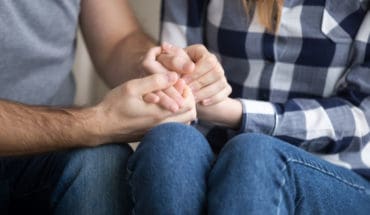Poor mental health affects all genders, but many men suffer in silence and this Men’s Health Week, Lee Hawker-Lecesne MBPsS, Clinical Director at The Cabin, Asia’s premier rehabilitation center, is helping men to break that silence, encouraging open conversations, and ensuring men have the support they deserve to thrive, not just survive.
The nation’s suicide statistics paint a grim picture and the stark reality of significantly higher suicide rates among men in the UK demands immediate action. According to Mind, 75% of all suicides are by males, and men under 50 are three times more likely to die by suicide than women. These statistics underscore the need to address the unique mental health challenges men face. One of the biggest hurdles is societal pressure around masculinity. Traditional notions often discourage men from expressing emotions openly, leading to feelings of isolation and a reluctance to seek help. Men may bottle up stress related to work, finances, or family, leading to anxiety, depression, or substance abuse. This silence surrounding mental health can have devastating consequences.
Men’s Health Week presents an ideal opportunity to dismantle the stigma surrounding help-seeking behaviour in men. By promoting targeted resources throughout the week, we can emphasize creating a society where men feel empowered to prioritize their well-being.
Stigma surrounding men’s mental health.
The stigma men face has many facets. Everyone presents different personas to the world, for example, you might have a work persona and a home persona. But men often hide behind masks that prevent forming deep connections. We must assist men in unmasking themselves, becoming more authentic, and building greater resilience in the process.
The “Strong Man” stereotype traditionally portrays young men as stoic and unemotional. This can make it difficult for men to acknowledge feelings of sadness, anxiety, or vulnerability. Consider a young man struggling with work stress. Societal pressure might tell him to “man up” and bottle it up, leading to internalized struggles and a reluctance to seek help. The stigma caused by fear of judgment can lead men to worry about being perceived as weak or incapable if they express emotional difficulties. A middle-aged man experiencing depression might hesitate to reach out to friends, fearing judgment or ridicule.
Men often resort to humor as a defense mechanism, deflecting from emotional issues. While humor can be a coping mechanism, it can also mask deeper problems and prevent men from seeking professional help. “It’s not unusual to hear a group of male colleagues making light of someone’s anxiety before a presentation,” Lee says. “But such humor can actively discourage the individual from opening up about their genuine struggles.”
The consequences of silence are characterized by a pervasive stigma that has real-world consequences. Men are less likely than women to seek help for mental health problems, leading to delayed diagnosis and treatment. This can worsen mental health conditions and lead to further complications in personal and professional life.
Men may also self-medicate with alcohol or drugs to cope with unaddressed mental health issues, creating a cycle of addiction or related substance abuse problems. The compounding effect of isolation and lack of support can lead to feelings of hopelessness and a heightened risk of suicide.
The Cabin offer gender-specific programs designed for men. Their programs typically provide a safe space for men to discuss their struggles and become equipped with tools to identify negative thought patterns. We use techniques to help men recognize unhelpful cognitive distortions that contribute to their emotional distress. For example, a client struggling with social anxiety might have the automatic thought “Everyone will judge me harshly” during social events. Through therapy, he can learn to challenge these distorted thoughts and develop more realistic and empowering beliefs about himself and social interactions.
Healthy coping mechanisms for men.
Men need to be taught ways in which they can manage stress, anxiety, and depression in a healthy way. This could include relaxation techniques like deep breathing or progressive muscle relaxation, mindfulness exercises to focus on the present moment, or assertive communication strategies to express their needs effectively.
By building emotional resilience, men can increase their emotional strength to navigate life’s challenges with greater confidence. By learning to identify, understand, and manage their emotions in a healthy way, men become more resilient in the face of stress and adversity.
Lee comments: “Highlighting men’s mental health is not just about raising awareness for one week a year; it’s about dismantling the stigma that keeps men silent and suffering. We need to create a society where men feel empowered to prioritize their emotional well-being just as readily as their physical health’.
Tips for promoting men’s mental health:
- Promoting Open Communication: Normalize conversations about mental health among men, encouraging them to talk openly about their struggles with friends, family, and colleagues.
- Tailored Support Services: Develop and promote mental health resources specifically designed for men, including greater access to support groups led by men who have overcome similar challenges. This can create safe spaces for men to connect and share experiences without fear of judgment.
- Media Representation: Challenge stereotypical portrayals of masculinity in media and celebrate men who openly discuss their mental health challenges. This can help break down the stigma and inspire others to seek support.
Men’s Health Week serves as a springboard for ongoing efforts. By working to dismantle the stigma, promote healthy coping mechanisms, and create safe spaces for open communication, we can empower men to prioritize their mental health and build a future where thriving, not just surviving, becomes the norm.
- Gut microbiome could delay onset of type 1 diabetes - 3rd April 2025
- The da Vinci 5 Robot Is Set To Transform Bariatric Care: - 31st March 2025
- Beyond money: the hidden drivers fuelling child food insecurity - 31st March 2025





